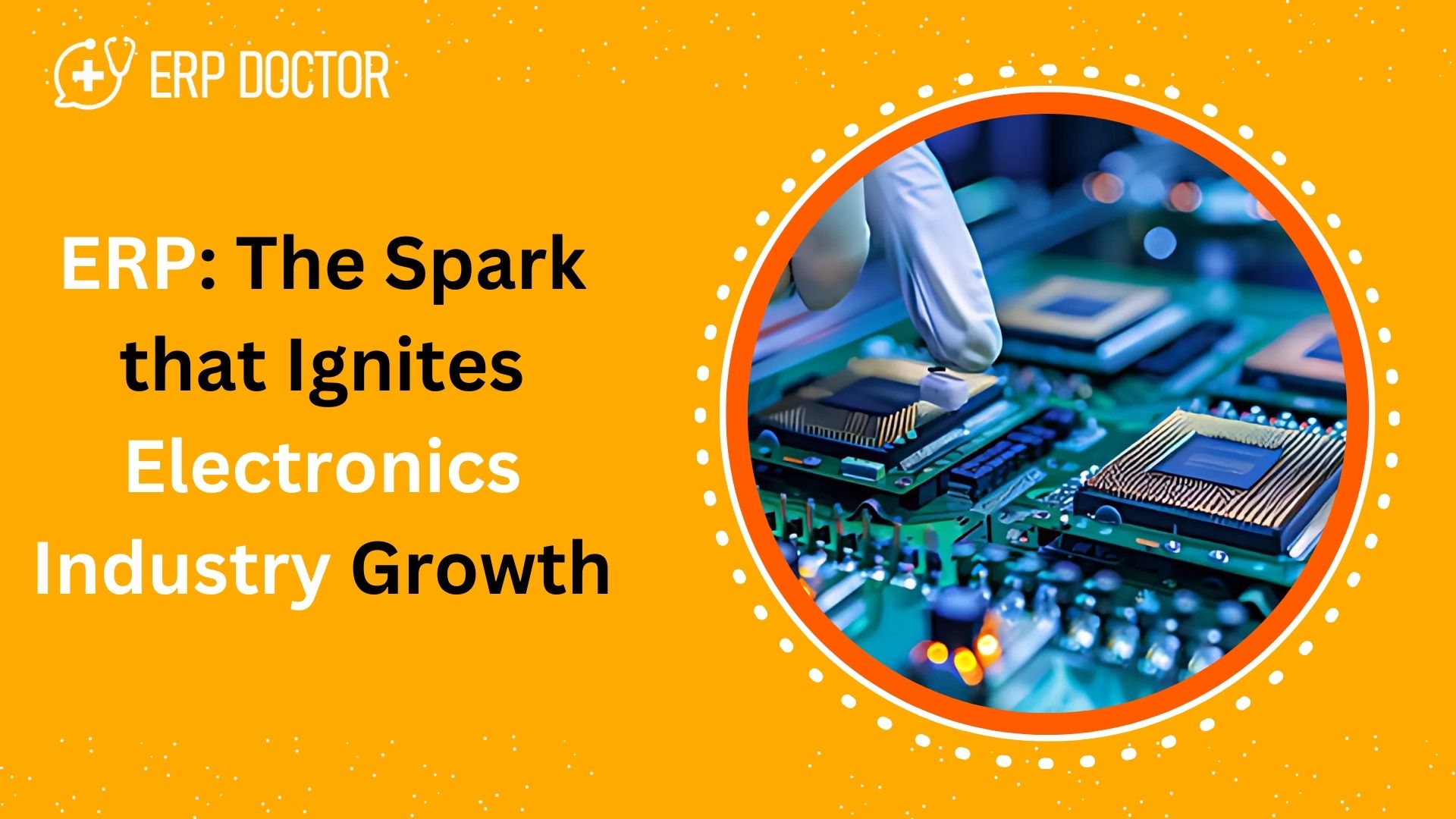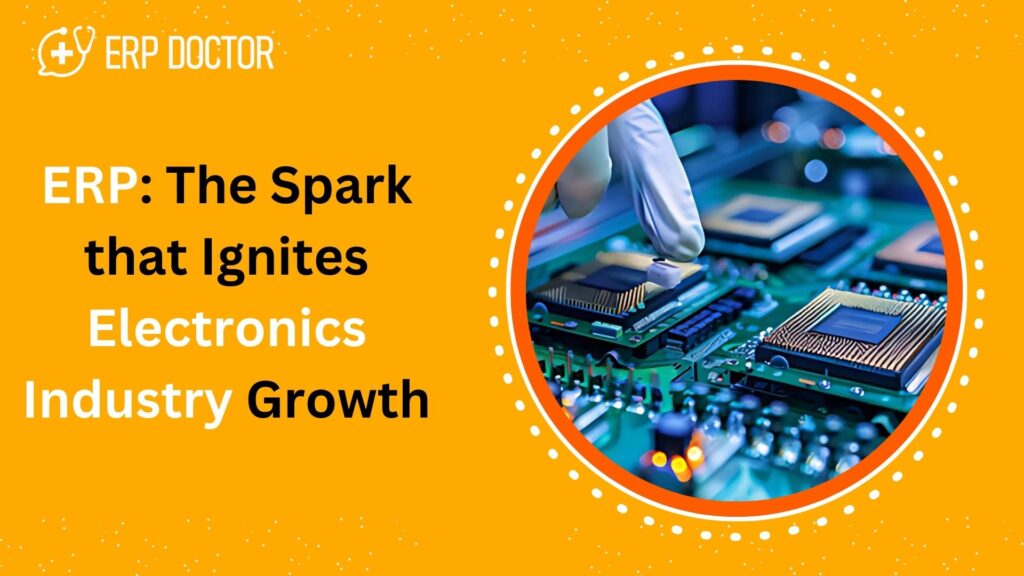
ERP: The Spark that Ignites Electronics Industry Growth

ERP for Electronics Manufacturing: A Catalyst for Growth
The electronics industry, characterized by rapid innovation and complex supply chains, is a cornerstone of global economic growth. However, maintaining efficiency and ensuring competitiveness requires more than innovative products—it demands optimized processes. Enterprise Resource Planning (ERP) systems serve as the spark that ignites growth in this dynamic sector by streamlining operations and enhancing decision-making. By leveraging ERP, electronics manufacturers can respond swiftly to changing market conditions and customer demands. Ultimately, ERP empowers the electronics industry to innovate, adapt, and thrive in an increasingly competitive landscape.
Why the Electronics Industry Needs ERP
- Complex Supply Chains
Managing suppliers, raw materials, and distribution across global locations can be daunting. ERP ensures real-time visibility and control. - Short Product Life Cycles
Products in the electronics industry often have shorter lifespans. ERP systems help manage design, production, and inventory efficiently. - Regulatory Compliance
Different countries impose various compliance standards on electronic products. ERP simplifies adherence to these regulations. - Demand for Customization
Consumers now demand personalized products. ERP facilitates mass customization while maintaining efficiency.
Key Benefits of ERP in the Electronics Industry
| Benefit | Description |
|---|---|
| Improved Inventory Management | Real-time tracking and optimization of inventory levels to avoid stockouts or overstocking. |
| Enhanced Forecasting | Use historical data and predictive analytics to anticipate market demand. |
| Cost Reduction | Streamline operations to cut costs related to production, storage, and distribution. |
| Regulatory Compliance | Automate compliance checks to meet global and local standards. |
| Better Customer Experience | Faster order fulfillment and personalized solutions enhance customer satisfaction. |
How ERP Addresses Key Challenges in the Electronics Industry
1. Inventory Optimization
ERP systems use AI and machine learning to predict demand trends and manage inventory effectively.
2. Supply Chain Management
With ERP, companies gain end-to-end visibility into their supply chain, enabling proactive management of disruptions.
3. Quality Assurance
By integrating quality control processes into ERP workflows, businesses can ensure product excellence at every stage.
4. Data-Driven Decisions
ERP centralized database allows access to real-time insights, empowering businesses to make informed strategic decisions.
Steps to Choose the Right ERP for Electronics Industry
- Define Your Needs:
Identify critical areas where ERP can add value. - Consider Scalability:
Ensure the ERP system can grow with your business. - Focus on Integration:
Choose an ERP that integrates seamlessly with your existing tools and systems. - Evaluate Vendor Expertise:
Look for vendors with experience in the electronics industry. - Budget and ROI Analysis:
Calculate costs and potential returns before making a decision.
Table: Leading ERP Solutions for Electronics Industry
| ERP Solution | Key Features | Ideal For |
|---|---|---|
| SAP S/4HANA | Real-time analytics, integration with IoT, and scalability. | Large enterprises. |
| Oracle NetSuite | Cloud-based ERP with CRM, inventory management, and analytics. | Mid-sized to large companies. |
| Microsoft Dynamics 365 | AI-driven insights, supply chain optimization. | All business sizes. |
| Infor CloudSuite | Industry-specific tools, real-time collaboration features. | Manufacturing companies. |
| Odoo | Open-source ERP with modularity and customization. | Small to mid-sized businesses. |
ERP for Electronics Industry: Your Questions Answered
Q1: What is ERP, and why is it important for the electronics industry?
A: ERP (Enterprise Resource Planning) is a software system that integrates various business processes into a single platform. For the electronics industry, it streamlines operations, improves supply chain management, and ensures regulatory compliance.
Q2: How does ERP help manage the electronics supply chain?
A: ERP provides real-time visibility, predictive analytics, and automated workflows, enabling businesses to handle complex supply chains efficiently.
Q3: Can small electronics manufacturers benefit from ERP?
A: Yes, modern ERP solutions are scalable and affordable, making them suitable for businesses of all sizes, including small manufacturers.
Q4: How long does it take to implement an ERP system in an electronics company?
A: The timeline varies depending on the complexity of the business, but most implementations take between 6 months to a year.
Q5: What challenges can arise during ERP implementation?
A: Common challenges include resistance to change, data migration issues, and inadequate training. Choosing an experienced vendor can mitigate these risks.
Powering Electronics Industry Growth with ERP
ERP systems act as a catalyst for growth in the electronics industry by addressing unique challenges, optimizing processes, and driving innovation. From inventory management to compliance and customer satisfaction, ERP provides the tools necessary to thrive in a competitive market. Companies that embrace ERP are better positioned to lead in this fast-evolving industry.
It’s time to revolutionize your electronics business? Contact ERP Doctor today and discover how our solutions can elevate your operations to the next level.
Want to speak to an expert? Fill in the form below, and we will be in touch with you shortly!
Warning: Trying to access array offset on value of type null in /home/u231991539/domains/erpdoctor.in/public_html/wp-content/plugins/wpforms/includes/class-frontend.php on line 109







